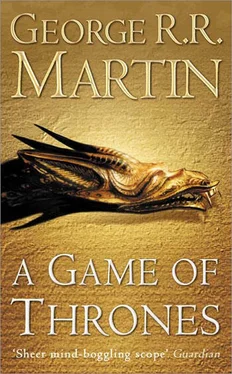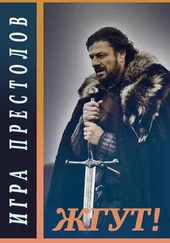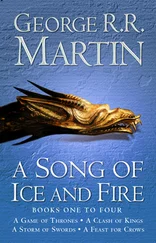It was those rooms, low, dusty garrets at the top of a cramped narrow staircase. “Leave your boots down here,” Masha told them after she’d taken their coin. “The boy will clean them. I won’t have you tracking mud up my stairs. Mind the bell. Those who come late to meals don’t eat.” There were no smiles, and no mention of sweet cakes.
When the supper bell rang, the sound was deafening. Catelyn had changed into dry clothes. She sat by the window, watching rain run down the pane. The glass was milky and full of bubbles, and a wet dusk was falling outside. Catelyn could just make out the muddy crossing where the two great roads met.
The crossroads gave her pause. If they turned west from here, it was an easy ride down to Riverrun. Her father had always given her wise counsel when she needed it most, and she yearned to talk to him, to warn him of the gathering storm. If Winterfell needed to brace for war, how much more so Riverrun, so much closer to King’s Landing, with the power of Casterly Rock looming to the west like a shadow. If only her father had been stronger, she might have chanced it, but Hoster Tully had been bedridden these past two years, and Catelyn was loath to tax him now.
The eastern road was wilder and more dangerous, climbing through rocky foothills and thick forests into the Mountains of the Moon, past high passes and deep chasms to the Vale of Arryn and the stony Fingers beyond. Above the Vale, the Eyrie stood high and impregnable, its towers reaching for the sky. There she would find her sister … and, perhaps, some of the answers Ned sought. Surely Lysa knew more than she had dared to put in her letter. She might have the very proof that Ned needed to bring the Lannisters to ruin, and if it came to war, they would need the Arryns and the eastern lords who owed them service.
Yet the mountain road was perilous. Shadowcats prowled those passes, rock slides were common, and the mountain clans were lawless brigands, descending from the heights to rob and kill and melting away like snow whenever the knights rode out from the Vale in search of them. Even Jon Arryn, as great a lord as any the Eyrie had ever known, had always traveled in strength when he crossed the mountains. Catelyn’s only strength was one elderly knight, armored in loyalty.
No, she thought, Riverrun and the Eyrie would have to wait. Her path ran north to Winterfell, where her sons and her duty were waiting for her. As soon as they were safely past the Neck, she could declare herself to one of Ned’s bannermen, and send riders racing ahead with orders to mount a watch on the kingsroad.
The rain obscured the fields beyond the crossroads, but Catelyn saw the land clear enough in her memory. The marketplace was just across the way, and the village a mile farther on, half a hundred white cottages surrounding a small stone sept. There would be more now; the summer had been long and peaceful. North of here the kingsroad ran along the Green Fork of the Trident, through fertile valleys and green woodlands, past thriving towns and stout holdfasts and the castles of the river lords.
Catelyn knew them all: the Blackwoods and the Brackens, ever enemies, whose quarrels her father was obliged to settle; Lady Whent, last of her line, who dwelt with her ghosts in the cavernous vaults of Harrenhal; irascible Lord Frey, who had outlived seven wives and filled his twin castles with children, grandchildren, and great-grandchildren, and bastards and grandbastards as well. All of them were bannermen to the Tullys, their swords sworn to the service of Riverrun. Catelyn wondered if that would be enough, if it came to war. Her father was the staunchest man who’d ever lived, and she had no doubt that he would call his banners … but would the banners come? The Darrys and Rygers and Mootons had sworn oaths to Riverrun as well, yet they had fought with Rhaegar Targaryen on the Trident, while Lord Frey had arrived with his levies well after the battle was over, leaving some doubt as to which army he had planned to join (theirs, he had assured the victors solemnly in the aftermath, but ever after her father had called him the Late Lord Frey). It must not come to war, Catelyn thought fervently. They must not let it.
Ser Rodrik came for her just as the bell ceased its clangor. “We had best make haste if we hope to eat tonight, my lady.”
“It might be safer if we were not knight and lady until we pass the Neck,” she told him. “Common travelers attract less notice. A father and daughter taken to the road on some family business, say.”
“As you say, my lady,” Ser Rodrik agreed. It was only when she laughed that he realized what he’d done. “The old courtesies die hard, my — my daughter.” He tried to tug on his missing whiskers, and sighed with exasperation.
Catelyn took his arm. “Come, Father,” she said. “You’ll find that Masha Heddle sets a good table, I think, but try not to praise her. You truly don’t want to see her smile.”
The common room was long and drafty, with a row of huge wooden kegs at one end and a fireplace at the other. A serving boy ran back and forth with skewers of meat while Masha drew beer from the kegs, chewing her sourleaf all the while.
The benches were crowded, townsfolk and farmers mingling freely with all manner of travelers. The crossroads made for odd companions; dyers with black and purple hands shared a bench with rivermen reeking of fish, an ironsmith thick with muscle squeezed in beside a wizened old septon, hard-bitten sellswords and soft plump merchants swapped news like boon companions.
The company included more swords than Catelyn would have liked. Three by the fire wore the red stallion badge of the Brackens, and there was a large party in blue steel ringmail and capes of a silvery grey. On their shoulder was another familiar sigil, the twin towers of House Frey. She studied their faces, but they were all too young to have known her. The senior among them would have been no older than Bran when she went north.
Ser Rodrik found them an empty place on the bench near the kitchen. Across the table a handsome youth was fingering a woodharp. “Seven blessings to you, goodfolk,” he said as they sat. An empty wine cup stood on the table before him.
“And to you, singer,” Catelyn returned. Ser Rodrik called for bread and meat and beer in a tone that meant now . The singer, a youth of some eighteen years, eyed them boldly and asked where they were going, and from whence they had come, and what news they had, letting the questions fly as quick as arrows and never pausing for an answer. “We left King’s Landing a fortnight ago,” Catelyn replied, answering the safest of his questions.
“That’s where I’m bound,” the youth said. As she had suspected, he was more interested in telling his own story than in hearing theirs. Singers loved nothing half so well as the sound of their own voices. “The Hand’s tourney means rich lords with fat purses. The last time I came away with more silver than I could carry … or would have, if I hadn’t lost it all betting on the Kingslayer to win the day.”
“The gods frown on the gambler,” Ser Rodrik said sternly. He was of the north, and shared the Stark views on tournaments.
“They frowned on me, for certain,” the singer said. “Your cruel gods and the Knight of Flowers altogether did me in.”
“No doubt that was a lesson for you,” Ser Rodrik said.
“It was. This time my coin will champion Ser Loras.”
Ser Rodrik tried to tug at whiskers that were not there, but before he could frame a rebuke the serving boy came scurrying up. He laid trenchers of bread before them and filled them with chunks of browned meat off a skewer, dripping with hot juice. Another skewer held tiny onions, fire peppers, and fat mushrooms. Ser Rodrik set to lustily as the lad ran back to fetch them beer.
Читать дальше
Конец ознакомительного отрывка
Купить книгу







![Брюс Крейвен - Библия босса [Учебник по лидерству и достижению целей. По мотивам легендарного цикла Game of Thrones] [litres]](/books/385551/bryus-krejven-bibliya-bossa-uchebnik-po-liderstvu-i-thumb.webp)




